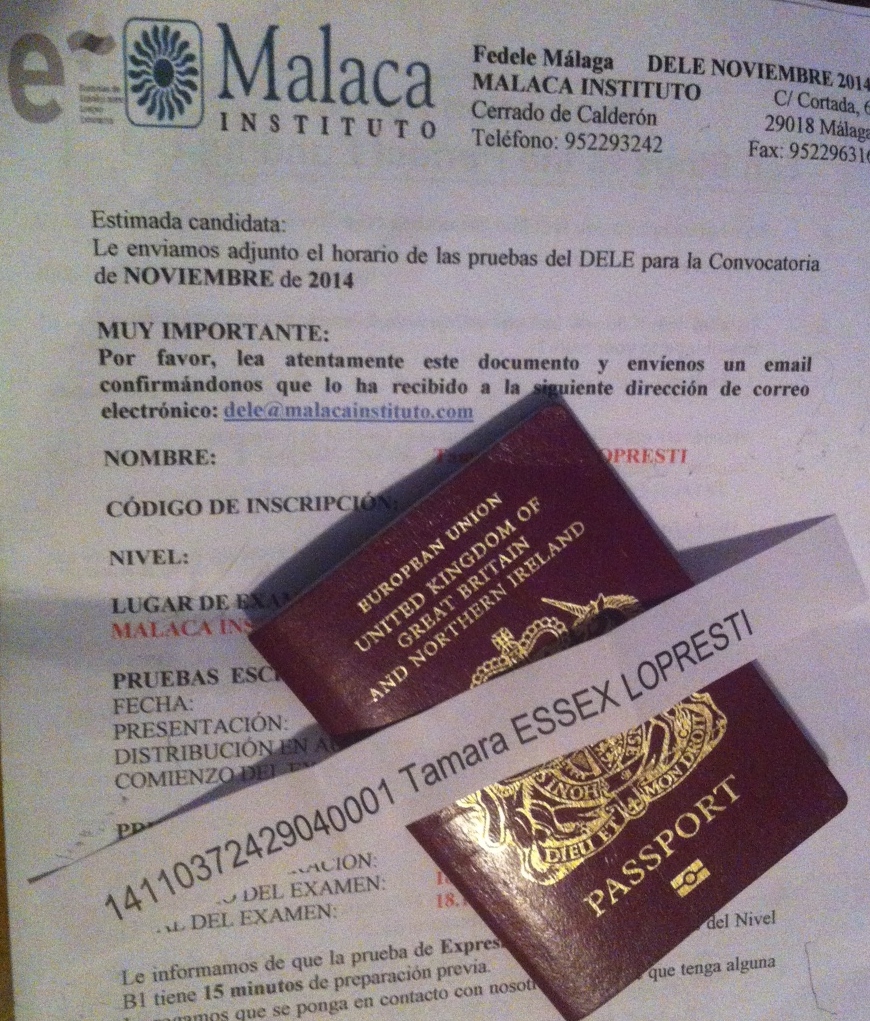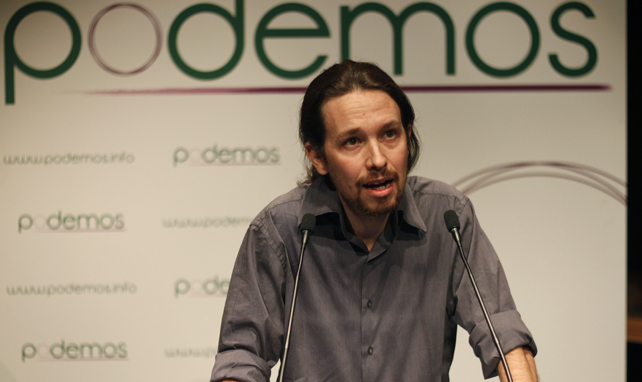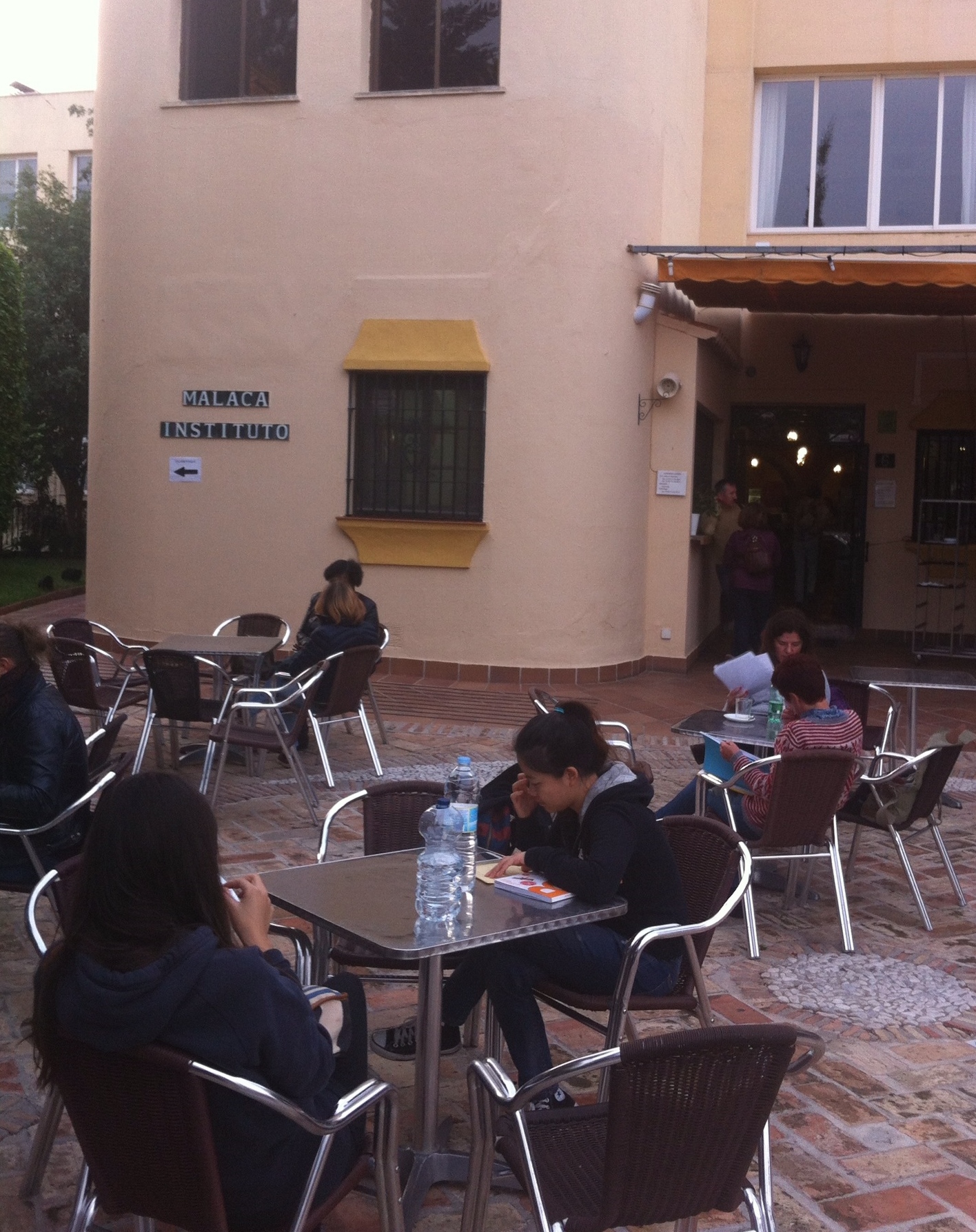It was hard to remember exactly why I was doing this. Arriving in the patio, the place seemed full of Italian teenagers. The only two adults in view were their teachers. It seemed as though I would be the only "mature student" taking the DELE Spanish exam. One by one they emerged in varying states of nervous excitement and reported back on what the topic had been for their 15-minute oral exam.
 As the clock crept inexorably towards 5.45 I was called into the "holding pen", my passport checked to prove I hadn't sent a Spanish friend in to take the oral exam for me, and I was offered six cards, face down, from which to choose two. My random choices were "Talk about your favourite sport" - errrrrm, no thank you! Or "Talk about a famous person you'd like to meet". OK, that one then.
As the clock crept inexorably towards 5.45 I was called into the "holding pen", my passport checked to prove I hadn't sent a Spanish friend in to take the oral exam for me, and I was offered six cards, face down, from which to choose two. My random choices were "Talk about your favourite sport" - errrrrm, no thank you! Or "Talk about a famous person you'd like to meet". OK, that one then.
Out on the patio of Málaca Institute (the testing centre for DELE, the Diploma de Español como Lengua Extranjera) the group from southern Italy seemed mostly to have done the "famous person" topic too. The last girl in before me had talked about Madonna, and two earlier girls had talked about the recent winner of the Italian X-Factor.
Then I was ushered through to the exam room. A lovely examiner was kind and reassuring but in my confusion I failed to catch her name. She introduced me to the other examiner, Ramón, who would sit behind me out of sight making notes of all my errors. "¡Ramón no existe!" she said. Ramón doesn't exist. But his pen was ready to record every shameful stumble.
A bit of chat to relax the candidate. She asked why I was studying Spanish. I explained that I live here so need the language for day-to-day living but was doing the exam purely for fun. I thought I saw one of her eyebrows twitch slightly. I told her that it had seemed like fun, up until about five minutes ago. Then we were onto the task. She asked which topic I had chosen. "Una persona famosa" I replied. I'm convinced her shoulders slumped. "Vale" she sighed.
I started by saying that in the first place I don't admire someone or want to meet them merely because they are famous. Her eyebrow twitched and stayed slightly raised. I then said I was going to speak about the politician  Pablo Iglesias. The second eyebrow rocketed skywards and both disappeared under her fringe. The task was to say a bit about him and why he is famous. I added a mini-history of Podemos and its roots (raices) in the peaceful demonstrations of the Indignados in la Plaza de la Puerta del Sol in Madrid in May 2011, mentioning that I had been there that first week as the camp developed, and had taken cartons of juice to the communal kitchen each morning on my way to my Spanish classes. The task is structured so that you have to finish by saying what you WOULD say to the person, in order to force candidates to use the conditional. I strung together some stuff about what I would say and forced in a "Si pudiera hablar con él, le diría ......" (If I were able to speak with him I would tell him .....) to make sure I got the mark.
Pablo Iglesias. The second eyebrow rocketed skywards and both disappeared under her fringe. The task was to say a bit about him and why he is famous. I added a mini-history of Podemos and its roots (raices) in the peaceful demonstrations of the Indignados in la Plaza de la Puerta del Sol in Madrid in May 2011, mentioning that I had been there that first week as the camp developed, and had taken cartons of juice to the communal kitchen each morning on my way to my Spanish classes. The task is structured so that you have to finish by saying what you WOULD say to the person, in order to force candidates to use the conditional. I strung together some stuff about what I would say and forced in a "Si pudiera hablar con él, le diría ......" (If I were able to speak with him I would tell him .....) to make sure I got the mark.
Then a five-minute interview on the same theme (in which we agreed that the "celebrities" who go into reality shows are so often the girlfriend or mother of a celeb rather than having any particular talent of their own), the description of a photo, a final dialogue about her being my house-sitter ("Mi casa es tu casa") and ya esta, all done. Phew! Why am I doing this???
 Back out in the patio the Italian girls asked me how it had gone. I couldn't remember much. Now more adults were gathering for their oral exam, and I shared what little I could recall about the structure. The college café was doing a roaring trade - coffee to boost the energy or calm the nerves! We were nine at our table, chatting about the exam and the topics, working out the details for Saturday's longer written tests, and hearing about the intensive courses people had done in the month leading up to the exam. Two of the adults needed the B1 level for their work. The rest of us were doing it for fun. We laughed, agreeing we must be mad. Why on earth were we doing this???
Back out in the patio the Italian girls asked me how it had gone. I couldn't remember much. Now more adults were gathering for their oral exam, and I shared what little I could recall about the structure. The college café was doing a roaring trade - coffee to boost the energy or calm the nerves! We were nine at our table, chatting about the exam and the topics, working out the details for Saturday's longer written tests, and hearing about the intensive courses people had done in the month leading up to the exam. Two of the adults needed the B1 level for their work. The rest of us were doing it for fun. We laughed, agreeing we must be mad. Why on earth were we doing this???
Chatting, sharing tips, relaxing. Joking about the ways we had forced subjunctives and conditionals into the exam. Linked by a common language, which for none of us was our own. The Iranian woman and another from the Faroe Islands. The young lad from France now living in Switzerland. The Italian teachers, over to guide their young charges through the exams. Two Chinese women, a Russian man, and me. Chatting, sharing our histories, the varying routes from all corners of the world, the journeys - both literal and metaphorical - that had brought us all on the same day to this one patio at a language school in Málaga. The Spanish language was the key that removed the barriers between us all. Then it all became clear. THAT was why we were doing it.
© Tamara Essex 2014 bbbbb http://www.twocampos.com
THIS WEEK’S LANGUAGE POINT:
All the guidelines, and all the teachers, made it clear that several conditionals and a couple of subjunctives needed to be "forced" into all parts of the exam in order to achieve the B1 level. I know I use it, genuinely without thinking, in many settings. "Espero que nos veamos pronto", "Si, cuando quieras", "Pues, dime cuando sepas" and loads more normal everyday phrases. And I made absolutely sure I had produced it a dozen times in the exam.
All well and good. Until the FINAL line on the FINAL part of the oral exam. The "casual chat" about the examiner house-sitting for me. I'd told her that IF it were to become very sunny the plants WOULD need watering (whoop whoop third conditional!) and that she could eat what was in the fridge. The closing line should have been easy. "When I get back, could you leave me a litre of milk?". When I get back. That uses "cuando" in the future. That's subjunctive. I can do that.
"Cuando ..... ummm. Cuando regreso ..... no, lo siento. Cuando ..... errrrr, cuando regresaré. No, no es el futuro, lo siento. Cuando ..... momentito por favor. Puedo hacerlo. Cuando ..... cuando regresa ..... ¡Uy! Vale, el verbo es regresar. ¡Vaya! Yo lo tengo. Cuando regrese .... ¡¡¡CUANDO REGRESE!!!" Fortunately she was laughing with me, and she kindly let me struggle through until I got there. I sneaked a look at Ramón (who didn't exist). He was laughing too. And I think he'd put his pen down.